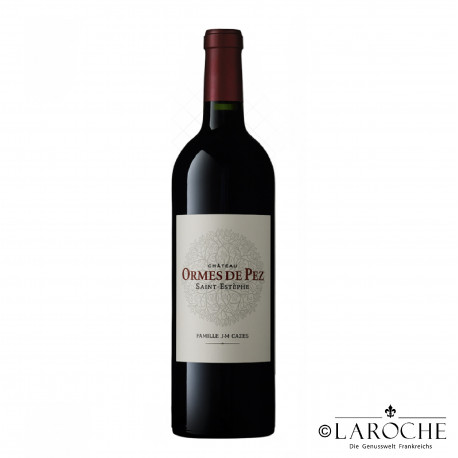


(€61.67 L)
Château Les Ormes de Pez is a harmonious, spicy and distinctive wine that reveals the authenticity of its terroir in the Saint-Estèphe. It will charm you with its opulence and elegance.
Château Les Ormes de Pez 2011 - Saint-Estèphe Cru Bourgeois Exceptionnel
Located in the north of the Saint-Estèphe appellation, Château Les Ormes de Pez is a historic estate whose origins date back to the 18th century. Owned by Jean-Michel Cazes, who also owns the grand cru classé Château Lynch-Bages, the estate benefits from an exceptional terroir of sandy-clay gravel, ideal for growing Bordeaux grape varieties.
The 2011 vintage was marked by a hot, dry spring, followed by a cool, wet summer and a hot, dry September, providing ideal conditions for gradual, even ripening of the grapes.
Blend
- 70% Cabernet Sauvignon, 20% Merlot, 10% Cabernet Franc
Tasting notes
- Colour : Deep red with purplish tints.
- Nose: Expressive, combining black fruit aromas (blackcurrant, blackberry) with spicy, vanilla and slightly roasted notes.
- Palate: Full-bodied and fleshy, with supple, ripe tannins, a fine structure and a full-bodied finish marked by a return to spicy notes.
Food and wine pairing
- Grilled or roasted red meat
- Duck breast
- Mature cheeses (Saint-Nectaire, Salers)
- Pan-fried mushrooms
Cellaring potential
Château Les Ormes de Pez 2011 is ready to drink now and can be cellared until 2028 for optimum development.
Ratings & Awards
- Wine Enthusiast: 94/100
- Bettane & Desseauve: 16/20
- Gault & Millau: 15,5/20
| 6 Items |
| Volume | 1,5l |
| Vintage | 2011 |
| Alcohol | 13° |
| Allergens | Contains sulphites. |
| Packing | OWC 6 bottles |
| Vines | Cabernet Sauvignon 50%, Merlot 41%, Cabernet Franc, Petit Verdot |
| Storage advice | Great cellaring potential |
| Consumption guidelines | Drink between 16 and 18°C. |
| Taste | Dry |
| Producer | Château Ormes de Pez, 29 Route des Ormes de Pez, 33180 Saint-Estèphe, France |
| Bottling | Mis en bouteille au Château |